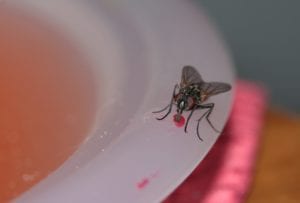
Top 10 Ways to Get Rid of House Flies in 2023
In 2023, as in any year, dealing with house flies remains a concern for many households. These pesky insects not only create a nuisance but also pose health risks as they are carriers of numerous diseases. In this guide, explore the top ten ways to get rid of house flies, and dive deep into understanding why professional fly control is a quintessential option.
Identifying Different Types of Flies
Before we embark on the journey to a fly-free home, it’s essential to identify the types of flies you might be dealing with. The most common types include the house fly, fruit fly, and drain fly. Each type has distinct characteristics and breeding grounds, and understanding these is the first step towards effective eradication.
House Flies
- Breeding Grounds: Decaying organic material, garbage.
- Characteristics: About ⅛-¼ inch long, gray.
Fruit Flies
- Breeding Grounds: Overripe fruits, vegetables.
- Characteristics: Tiny, red eyes.
Drain Flies
- Breeding Grounds: Drains, sewage, decaying organic material.
- Characteristics: Small, fuzzy, moth-like wings.

Top 10 Ways to Get Rid of Flies
1. Keep Your House Clean
Maintaining cleanliness is paramount. Regularly take out the trash, clean the counters, and ensure no food is left exposed. Additionally, maintaining a pristine environment within your home is the cornerstone of keeping house flies at bay. Let’s delve into what draws flies into your living spaces and how you can avert these attractors by focusing on cleanliness.
Flies Attraction Points in Your Home:
Food Particles:
Flies are particularly attracted to food particles left unattended. They can quickly detect the scent of food, making your kitchen and dining area prime spots for their invasion.
Garbage:
Garbage bins, especially those with organic waste, are hotspots for flies. They breed in decaying organic matter, making your trash can a perfect breeding ground.
Uncovered Food:
Leaving food uncovered is an open invitation for flies. They are attracted to fruits, vegetables, and any food items left out in the open.
Liquid Spills:
Spilled liquids, especially sugary ones, attract flies. Any unrestrained liquid provides a hydration source for these pests.
Cleaning Strategies to Repel Flies:
Regular Trash Disposal:
Ensure you discard your trash regularly and keep the bins sealed. Consistent waste management prevents the accumulation of organic matter where flies can breed.
Proper Food Storage:
Store food properly in airtight containers and refrigerate as required. Limiting access to food sources significantly deters flies.
Prompt Cleaning of Spills:
Clean any liquid spills immediately to prevent attracting flies.
Frequent Cleaning of Food Preparation and Consumption Areas:
Regularly clean your kitchen and dining areas, ensuring no food particles are left behind.
By ensuring cleanliness in these aspects, you make your home uninviting for flies, significantly reducing the chances of infestation. According to the World Health Organization, house flies are not only a nuisance but also potent carriers of diseases due to their attraction to waste and rotten food. Proper cleaning and waste management can prevent the health risks associated with house fly infestations.

2. Use Fly Traps
Commercial fly traps attract flies and trap them, preventing them from roaming around your home. As house flies can be a significant nuisance and a health hazard, employing various fly traps can be an effective strategy to eliminate them from your living space. Here is a comprehensive look at the different types of fly traps and their effectiveness.
Sticky Fly Traps:
Sticky fly traps, or fly paper, is one of the most common and simple fly trap types. It works by attracting flies to land on the sticky surface, trapping them. It’s an inexpensive option but needs to be replaced frequently for maintained effectiveness.
Electric Fly Zappers:
Electric fly zappers are a popular choice for both indoor and outdoor use. They use ultraviolet light to attract flies and other insects, and once the fly makes contact with the electrified grid, it’s instantly killed. They are effective but may be pricier and need a power source.
Light Traps:
Light traps do not kill flies but lure them away from your living spaces. Flies are attracted to the light, and once they enter the trap, they can’t escape. It’s a quieter and less intrusive method but may not be as effective as other trap types.
Bait Traps:
Bait traps attract flies by using a scent or food-based lure. Once the flies enter the trap to get to the bait, they cannot escape. Bait traps can be very effective, especially for fruit flies, but the bait often needs to be replaced, and some people might find the smell off-putting.
Natural Traps:
Natural traps like DIY vinegar traps can also work effectively against house flies. Fill a jar with apple cider vinegar and dish soap, cover it with plastic wrap, and poke holes in the top. Flies will be drawn to the vinegar scent and get trapped inside the jar.
Effectiveness:
The effectiveness of each fly trap can vary. Factors including the extent of infestation, the location placed, and the type of flies in your home can all impact the performance of the trap. For significant infestations, professional pest control is often the most reliable and efficient method to rid your home of flies permanently.
By understanding the different fly trap types and their functionality, you can make an informed decision for your specific fly problem, potentially saving time, effort, and resources in ensuring a fly-free environment in your home.

3. Natural Remedies
Utilize natural remedies such as basil, lavender, or lemongrass to deter flies. Creating a fly-free zone in your home is possible without resorting to harsh chemicals. Natural remedies, while requiring patience and persistence, can offer effective and non-toxic solutions to deal with pesky house flies. Below, you will find several natural fly remedy examples that you can try at home.
Essential Oils:
Essential oils like lavender, eucalyptus, peppermint, and lemon can act as natural fly repellents. You can add a few drops of your preferred essential oil to a diffuser or mix them with water and spray around your home. Not only will your house smell wonderful, but it will also be less inviting to house flies.
Herbs and Plants:
Planting herbs like basil, mint, rosemary, or lavender near your windows or entrance areas can help keep flies at bay. Flies are repelled by the scent of these plants, providing you with a natural and decorative fly deterrent.
Cider Vinegar Trap:
Create a vinegar trap by filling a jar or cup with apple cider vinegar and adding a few drops of dish soap. Cover the top with plastic wrap, secure it with a rubber band, and poke small holes in the plastic. The scent of vinegar attracts the flies, and the soap reduces the surface tension, trapping them in the liquid.
Cloves in Citrus Fruit:
Push whole cloves into a half lemon or orange and place it on a plate in your kitchen or dining area. Flies dislike the scent of cloves, and the citrus also repels them, keeping your space fly-free.
Homemade Fly Strips:
Make your own fly strips by cutting strips of paper, coating them with a mixture of corn syrup and sugar, and hanging them around your home. Flies will get stuck to the sweet sticky surface, similar to store-bought fly paper.
All these natural fly remedies are safe, cost-effective, and eco-friendly alternatives to chemical fly repellents and traps. They take advantage of the flies’ behavioral patterns and sensory preferences, offering humane and holistic solutions to your fly problems. For persistent infestations, combining these remedies with other methods, including professional pest control, can enhance effectiveness and ensure a fly-free environment in your home.

4. Fly Repellent Sprays
In the arsenal against house flies, fly repellent sprays are a convenient and potent tool. These sprays can instantly make an environment inhospitable for flies, ensuring your spaces remain fly-free. But it’s crucial to choose the right kind of spray that aligns with your health and environmental concerns.
Chemical Fly Repellent Sprays:
Chemical fly repellent sprays are widely available and effective in killing flies quickly. They contain active ingredients that target the nervous system of the flies, leading to instant death. However, these sprays often contain harsh chemicals that may not be suitable for households, especially those with children, pets, or individuals with allergies and respiratory conditions.
Natural Fly Repellent Sprays:
Natural fly repellent sprays are a gentler alternative to their chemical counterparts. Made with natural ingredients such as essential oils (like citronella, eucalyptus, and lemon oil), they deter flies by their scent and taste. Although they may not kill flies instantly, they effectively keep flies away without harming the environment or posing risks to your health.
5. Use Light Traps
Light traps, also known as fly light traps or insect light traps, are devices that use ultraviolet light to attract flies and other flying insects. They are a non-toxic and environmentally friendly option for controlling fly problems in your home or business.
How Light Traps Work:
Light traps emit ultraviolet light that attracts flies towards the device. Once the flies get close, they are either trapped on a sticky board or zapped by an electric grid, effectively eliminating them. This method is particularly useful for areas where using chemical methods for fly control is not suitable, such as food preparation areas or restaurants.

6. Proper Waste Management
Effective waste management is fundamental in keeping house flies and other pests at bay. House flies are particularly attracted to organic waste such as food leftovers, which they need not just for feeding but also for laying eggs. Ensuring that waste is managed properly can significantly reduce the attraction for flies to invade your living spaces.
7. Seal Cracks and Openings
Prevent flies from entering by sealing all cracks and openings around doors and windows.
8. Use Fly Swatters
A traditional, yet effective method is using a fly swatter. While this method is the most time-consuming option, it can be a quick and easy fix for a few pesky, uninvited flies.
9. Employ DIY Traps
Create homemade traps using vinegar or sugar to attract and trap flies.
10. Hire Professional Pest Control
Despite all these methods, the most effective way to ensure the total eradication of flies is by hiring professional pest control services. Professionals are equipped with the knowledge, skills, and tools necessary to eliminate flies from your home thoroughly. They assess the extent of the infestation, identify the types and breeding grounds, and employ targeted strategies to get rid of flies, preventing future infestations as well.

The Superiority of Professional Pest Control
Knowledge and Expertise
Professional pest controllers are trained experts who understand the behavior and lifecycle of flies. They can identify the source of the problem and eliminate it, ensuring a long-term solution.
Advanced Tools and Techniques
Pest control services utilize advanced tools and techniques to eradicate flies effectively and efficiently.
Safety
Professional services ensure the safety of your household by using non-toxic and environmentally friendly methods.
While various methods can help manage and reduce the presence of flies in your home, hiring a professional pest control service is the most reliable and effective solution to ensure a fly-free environment in 2023 and beyond. An investment in professional service is an investment in the health, cleanliness, and comfort of your living space.
Professional Fly Control Costs
When it comes to ensuring your home is fly-free, sometimes the most effective and stress-free solution is to hire professionals. Professional fly control services have the expertise, equipment, and effective pest control solutions that can quickly and efficiently eliminate a fly problem in your home.
Cost Estimation:
The cost of hiring a professional fly control service can vary greatly based on the severity of the infestation, the size of your property, and the methods used to eliminate the flies. On average, homeowners might spend anywhere from $100 to $500 for fly control services.
Factors Affecting the Cost:
- Infestation Severity: The more severe the infestation, the more it will cost to get it under control.
- Size and Location of Property: Larger properties or properties located in areas prone to flies might incur higher charges.
- Treatment Methods: Different pest control companies use different methods. Some may use chemicals, while others might use traps or other non-chemical methods, which can also influence the cost.

Benefits of Professional Fly Control:
Investing in professional fly control services also means investing in a long-term solution for keeping your home fly-free. Professionals can identify and eliminate breeding sites and provide advice for preventing future infestations. The cost of hiring professionals should be weighed against the potential health risks and inconvenience that a persistent fly problem can pose to you and your family.
Getting Quotes:
It’s advisable to get quotes from several different companies. Ask them about their methods, guarantees, and customer service. Make sure the company is licensed and reputable, with positive reviews from past customers.
While the upfront cost might seem high, the peace of mind, effectiveness, and convenience of hiring a professional fly control service often outweigh the expense. It’s an investment in the health and comfort of your living environment, ensuring it is a hygienic and pleasant place to be, free from the nuisances and health risks that flies can bring.

Leave a Reply